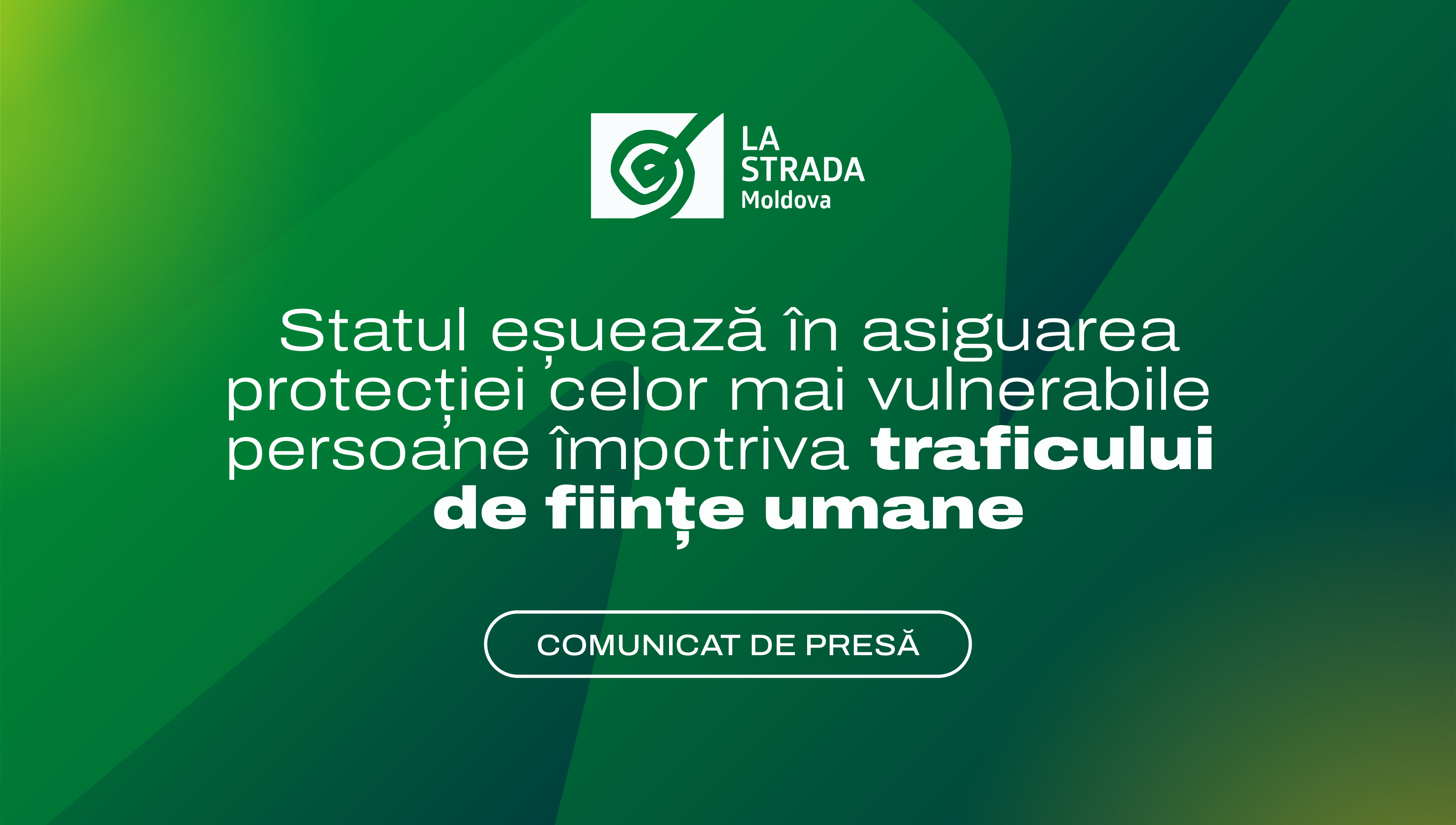The state fails to ensure the protection of the most vulnerable people against human trafficking

On World Day Against Trafficking in Persons, the International Center “La Strada” reaffirms the systemic failure of the Republic of Moldova in its national response to human trafficking.
In its most recent report published this June, the Council of Europe’s Group of Experts on Action against Trafficking in Human Beings (GRETA) confirmed multiple gaps in the implementation of the Convention on Action against Trafficking in Human Beings. The authorities’ response is described as fragmented and poorly adapted to the real needs of the most vulnerable.
GRETA highlighted priority areas requiring urgent intervention by the authorities, including:
- Preventing the exploitation of children in residential institutions and exploitation through agricultural labor;
- Identifying victims of human trafficking, in particular victims of labor exploitation and victims among asylum seekers or foreign migrants;
- Providing long-term assistance to victims and supporting their reintegration into society, including through access to the labor market and social services;
- Ensuring that all victims of human trafficking have effective access to public healthcare by including them among the vulnerable groups covered by medical insurance.
- Ensuring prompt investigation and effective prosecution leading to proportionate and dissuasive sanctions, as well as trials within a reasonable time frame, in line with the jurisprudence of the European Court of Human Rights (Article 6 §1 of the ECHR) and standards set by the European Commission for the Efficiency of Justice (CEPEJ), among others.
Earlier this year, the European Court of Human Rights (ECtHR) condemned the Republic of Moldova for the ineffective investigation of a forced labor and sexual abuse complaint committed by a foster family where a woman with intellectual disabilities had been placed following her deinstitutionalization from a neuropsychiatric residential facility (I.C. v. the Republic of Moldova).
The ECtHR found that the state had failed to prevent trafficking and exploitation risks. Although the specific circumstances of the case indicated a credible suspicion that the applicant might have been a victim of human trafficking or other forms of exploitation, the authorities failed to prevent such risks. The investigation was superficial, ignoring the coercive context and the applicant’s vulnerability. Prosecutors failed to examine alternative offences, even though the facts described by the applicant did not meet all the elements of the human trafficking offence.
This case is not unique. In the past five years, 935 human trafficking victims have been identified in the Republic of Moldova. Most come from extremely vulnerable backgrounds – impoverished rural areas, dysfunctional families, residential centers for people with disabilities, the unemployed, or struggling migrants.
During this period, the International Center “La Strada” has recorded 331 calls concerning suspected trafficking and exploitation cases affecting 525 persons, and has provided psychological and legal assistance to 73 child trafficking victims.
The experience of the International Center “La Strada” in the field of anti-trafficking confirms the following systemic issues:
- Human trafficking is deeply affected by recent migration trends and the impact of technology, which change the way the phenomenon manifests itself. This creates challenges for classifying offences and collecting evidence.
- Lengthy investigations and delayed court proceedings are used as a defense strategy. In many cases, especially those involving multiple defendants, the defense deliberately uses various tactics to prolong trials, undermining victims’ trust in justice and exposing them to stereotypes and prejudice.
- Human trafficking and child trafficking cases are often identified too late. In some cases, minor victims were identified only after five years of sexual exploitation.
- National authorities have limited capacity to respond to cases of human trafficking involving foreign migrants identified on Moldovan territory.
On the occasion of the World Day Against Trafficking in Persons, observed annually on 30 July, the International Center “La Strada” calls on the Government to adopt a comprehensive approach to addressing the violations found in I.C. v. Moldova and preventing future violations. When developing the action plan to implement this judgment, we urge the Government to take into account GRETA’s findings in this field.
In the context of institutional reforms eliminating the specialization of law enforcement and the judiciary in investigating and adjudicating human trafficking cases, we call on the authorities to urgently undertake the following actions:
- Develop a dynamic analysis of human trafficking, focusing on new trends and challenges;
- Conduct an impact assessment of reforms in law enforcement and the judiciary in the anti-trafficking field, taking into account international recommendations, including those set out in Directive 2011/36/EU of the European Parliament;
- Provide training to all police officers within the Criminal Investigation Directorate of the National Inspectorate of Investigations and territorial police inspectors on investigating human trafficking offences and applying a victim-centered approach, including in cases of non-commercial sexual exploitation;
- Develop and circulate guidelines/instructions on efficient investigation and evidence examination procedures in human trafficking cases, including recommendations on the role and involvement of other professionals supporting victims (escorts, psychologists, etc.).
The World Day Against Trafficking in Persons is observed annually on 30 July, as proclaimed by the United Nations General Assembly in Resolution 68/192 of 18 December 2013.
